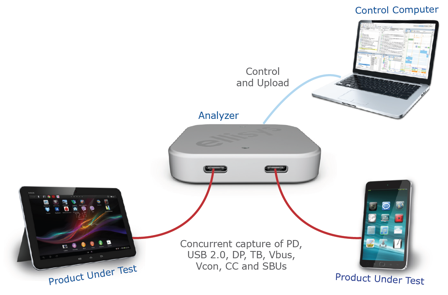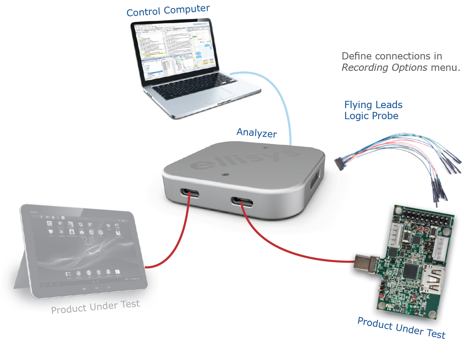
렌탈 및 기술문의 : 010-4221-0660
Pocket-sized and bus-powered, the Ellisys Type-C Tracker delivers comprehensive support for a multitude of protocols and electrical signaling that operate over the USB Type-C connection standard.
Detailed decoding of packets, transactions, and other communications is provided in a flexible and easy to understand manner over the field-proven and ubiquitous Ellisys software application. The Tracker provides a variety of error detections, precision timing tools, and performance measurement tools. Designed with ease-of-use in mind, the Type-C Tracker is the ideal companion for a wide variety of tasks associated with Type-C product development.
All-in-One: Concurrent and tightly synchronized capture of USB Power Delivery protocol, Type-C voltage tracking (Vconn, Vbus, SBU, and CC), USB 2.0, Thunderbolt™ 3 / USB4 Sideband and DisplayPort™ auxiliary (AUX) signaling over the Type-C SBU lines, alternate (ALT) mode support for DisplayPort, HDMI, and Thunderbolt / USB4, and capture and decoding of Serial Wire Debug (SWD) protocol, UART, Serial Peripheral Interface (SPI) I2C vendor-specific protocols, and Type-C Port Controller Interface traffic over I2C.
Bus-Powered: Just attach to your computer’s USB port and go, no bricks to carry around.
Super Portability: Pocket-sized at 63.5 x 63.5 x 12 mm (2.5” x 2.5” x 0.47”)
Real-Time Display: Visualize captured traffic in real time with the efficiency of 5th generation Ellisys protocol analysis software.
Precision Timing: Understand timing issues quickly with highly accurate timing characterizations of all captured protocols, electricals, and logic signals.
Professional Software: Use the acclaimed, widely adopted and highly flexible Ellisys multi-protocol analysis software.
Secure Cloud Access: Quickly and easily exchange captures and bookmarks with colleagues using the built-in secure cloud feature.
Detailed Protocol Decoding: All elements from the latest specifications to the fields bits and bytes.
Integrated Logic Analysis: Visualize digital signals such as GPIOs, interrupts, debug ports, etc., concurrently and perfectly synchronized with all other captured traffic.
Free Maintenance: Free lifetime software updates as well as free fully-featured viewer software.
Field Upgradeability: Type-C Tracker analyzers are field upgradeable to allow the addition of features (i.e., to advance from one Edition to another).
Type-C Communications and Voltages
Products under test (PUTs) are connected to the Type-C receptacles on the front panel of the Tracker, with a Control Computer connected to the Tracker for power and application control. All supported traffic is captured and uploaded real-time to the Control Computer. Gigabit signaling is passed through the analyzer. Conveniently, the Tracker’s capture engine will automatically determine which Type-C Communications Channel (CC) pin is being used for USB Power Delivery communications and which pin is being used for Vconn. Various protocols operating over the Type-C Sideband Use (SBU) lines are also captured, in addition to USB 2.0 traffic. A special cable (not shown) is supplied to manage proper signal routing.

Logic Signals, TCPCI/I2C, and Other Serial Protocols
The Logic connection can be used to capture logic /general purpose IO signals and several protocols, such as I2C, UART, SWD, and SPI. This traffic is displayed in various windows throughout the Tracker software application, including protocol-specific Overviews and the Instant Timing view, for various protocol analyses and precision timing-related characterizations. All Logic Connection traffic and signaling can be captured concurrently and in precise synchronization with all other Logic Connection inputs as well as all captured front-panel Type-C traffic (CC, SBU, and USB 2.0), including voltage states. Logic signals captured can be grouped into user-named buses for added convenience.

Captured protocols and voltages, along with captured logic signals, are presented to the user real-time by the Ellisys application software. An assortment of displays provides an intuitive understanding of traffic, protocol sequences, performance criteria, error conditions, electrical characteristics, timing details, standard/class decoding, protocol decoding, and more.
The physical capture of supported communications is accomplished using latest-generation hardware capture technology to non-intrusively tap and reliably pass through supported protocols while passively passing gigabit traffic.
The integrated logic analysis provides developers with efficient and convenient visualization of external digital signals (such as discrete outputs of FPGA/ ASIC) in synchronization with all other captured traffic. Captured GPIOs can be grouped into buses and given user-defined names for easy identification.
All protocol traffic, logic signals, and voltages of Type-C signaling and power lines (CC, Vconn, SBU_A, SBU_B, and Vbus) are tracked using the Instant Timing view. These events are perfectly synchronized with each other and with the Overview windows. Precision timing measurements can be made between any events within the Timing view to precisely characterize timings. Throughput and statistical information is also provided. Events selected in the Overviews are highlighted and aligned to the Instant Timing view.
Tracking Type-C electrical signaling is crucial to understand state machine behaviors. Timings and voltage levels of the various Type-C signaling and power lines have specific meanings and purposes. When not properly implemented, they can wreak havoc with an implementation. Additionally, it is important to precisely relate these voltage values and states to protocol events for performance characterizations and debug exercises. The Type-C Tracker application provides accurate monitoring of Vbus, Vconn, SBU_A, SBU_B, and CC in the Instant Timing view, associated with any captured logic signals and protocol packets and events.
USB Power Delivery protocol provides a wide array of mechanisms to negotiate power, and can also be used as a sideband channel for standard and vendor-defined messages. Additionally, Power Delivery provides methods to discover, enter, and exit alternative modes, identified by a unique identifier (SVID) and defined by vendors or standards bodies outside of the scope of the USB Implementers Forum (USB-IF). The Type-C Tracker supports capture and decoding of ALT Mode entry, discovery, and exit protocols as well as ALT Mode commands. Additionally, the Tracker supports several ALT Mode protocols that are conveyed over the Type-C sideband lines (SBU_A and SBU_B), including DisplayPort Auxiliary (AUX) traffic and UART for Thunderbolt 3 / USB4.
등록된 상품이 없습니다.
상품문의가 없습니다.